Index relies entirely on the support of donors and readers to do its work.
Help us keep amplifying censored voices today.
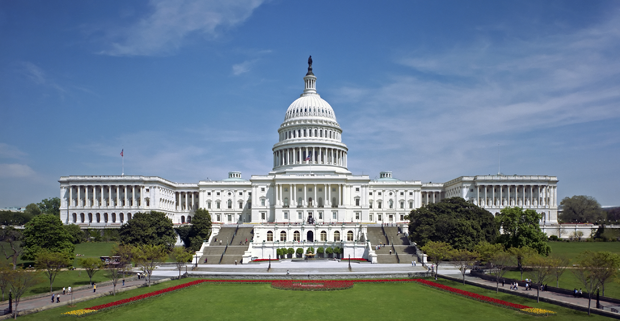
Josh Stearns argues that the US shield law sets a dangerous precedent by allowing the government to decide who is a journalist. (Photo: Wikipedia)
The Free Flow of Information Act – also known as the “Shield Law” – is meant to protect journalists from having to reveal their sources during investigations by the U.S. government. The bill comes amidst news organizations’ growing concern about the impact of surveillance of the press by the Justice Department and the National Security Agency.
Last week a Senate committee approved the bill. The next step would be a vote by the full Senate. However, as currently written, the bill creates two classes of journalists and sets a dangerous precedent for press freedom.
The first class is protected by default. It includes people who have been employed by newsrooms for at least one year in the last 20 years, or for three months in the last five years. This is actually an improvement over an earlier version, but still excludes many freelancers, bloggers and citizen journalists.
For those not in that class, the bill allows a judge to decide if “such protections would be in the interest of justice and necessary to protect lawful and legitimate newsgathering.” This “judicial discretion” catchall means a broad range of acts of journalism could be protected, but raises questions about the necessity of the first definition of journalist.
The judicial discretion inclusion is significant because the case law in this area strongly asserts protection for all acts of journalism, not just some pre-defined set of “legitimate” journalists. For example, in a 2006 decision a California state appellate court wrote:
We decline the implicit invitation to embroil ourselves in questions of what constitutes “legitimate journalis[m].” The shield law is intended to protect the gathering and dissemination of news, and that is what petitioners did here. We can think of no workable test or principle that would distinguish “legitimate” from “illegitimate” news. Any attempt by courts to draw such a distinction would imperil a fundamental purpose of the First Amendment.
This point is echoed in decisions by the Second, Third and Ninth Circuit federal courts of appeals and the U.S. Supreme Court. And there is a growing consensus amongst leaders inside traditional journalism institutions that we should protect all people engaged in the journalism process regardless of their occupation or affiliation. The Society for Professional Journalists recently passed a resolution that “rejects any attempts to define a journalist in any way other than as someone who commits acts of journalism” and even considered changing its name to reflect this.
Which raises the question, why did some Senators work so hard to create two tiers of journalists and spill so much ink trying to limit those who can be covered?
One answer might be to send a message about who they see as “real” journalists and to further chill sources who might talk to independent reporters. This bill has to be seen in the context of Washington’s ongoing war on leaks and some elected officials’ efforts to criminalize journalism.
The debate over this bill exposed a deep and troubling thread of concern about the shifting media landscape and the nature of a truly participatory fourth estate. During the Senate committee meeting, Sen. Feinstein made it clear that she wanted to limit the bill so it wouldn’t protect people like “the 17 year old who drops out of high school, buys a website for five dollars, and starts a blog.” Other Senators made even more troubling statements, speculating and wringing their hands about spies hiding in newsrooms, foreign journalists at Al Jazeera, and protections for Edward Snowden and Wikileaks.
Most such concerns are baseless because the bill includes a huge “national security” loophole that would let prosecutors force journalists to testify about their sources, or face jail time. This exception makes the bill useless for a huge number of journalists who are most often in possession of leaked material. Yet it’s widely believed that this provision was critical to getting White House support of the bill.
What’s at stake here is not just the narrow purview of this bill, but the precedent of allowing government to define who is and is not a journalist. It is a sad irony that a bill meant to expand press freedom could in fact erode First Amendment rights of non-traditional media makers.
This could all be avoided, and the bill could be greatly strengthened and simplified by defining journalism as an act, a process that anyone can participate in, instead of a profession limited to a few practitioners. As the bill moves forward, making that change should be our top priority.
This article was originally posted on 18 Sept 2013 at indexcensorship.org
[vc_row][vc_column][vc_row_inner equal_height=”yes” css=”.vc_custom_1493909012654{background-image: url(https://www.indexoncensorship.org/wp-content/uploads/2017/05/USMedia_ReportCover_1460x490-revised.jpg?id=90089) !important;background-position: center !important;background-repeat: no-repeat !important;background-size: cover !important;}” el_class=”text_white”][vc_column_inner width=”1/2″][/vc_column_inner][vc_column_inner width=”1/2″][vc_custom_heading text=”It’s not just Trump” link=”url:https%3A%2F%2Fwww.indexoncensorship.org%2Fnot-just-trump-us-media-freedom-fraying-edges%2F|||”][vc_column_text]
Read our May 2017 review of threats to press freedom in the United States.[/vc_column_text][/vc_column_inner][/vc_row_inner][vc_empty_space height=”20px”][vc_column_text]
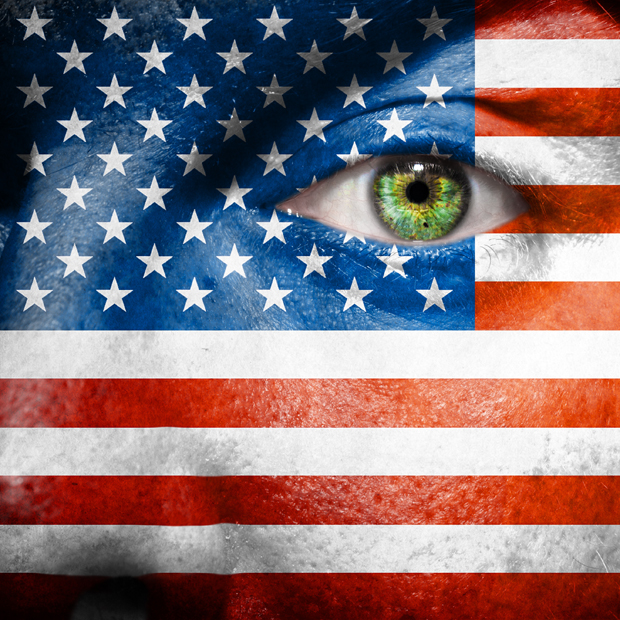
(Photo illustration: Shutterstock)
Freedom of expression is generally protected in the US, but political, legal, economic and cultural factors continue to constrain this fundamental right. The First Amendment of the US Constitution prohibits laws that abridge free speech, academic freedoms and the right to assemble are generally protected, and violence against journalists is rare.
National security is used excessively to justify free speech and privacy restrictions.
Revelations over the National Security Agency’s “Prism” programme, which it is claimed gives the US government powers of mass surveillance over web communications, have caused huge concern over the authorities’ attitudes to free speech and privacy.
Government transparency and accountability are also key concerns. The 1966 Freedom of Information Act and various state laws are meant to shine light on classified government documents, but many agencies do not comply with these laws or do so significantly later than mandated and with heavily redacted information. The aggressive prosecution and sentencing of WikiLeaks source Bradley Manning and the pursuit of Edward Snowden highlights the Obama administration’s attitude to whistleblowers.
Beyond security and secrecy, some of the greatest challenges to freedom of expression are linked to rapid shifts in technology and online behaviour so that is for digital section. Money is also key. The Citizens United v. Federal Election Commission Supreme Court case in 2010 extended first amendment rights to corporations and unions, threatening the free speech rights of individuals by diminishing the power of their voices to compete with billion-dollar industries. Although US libel laws generally protect the public interest — public figures must prove actual malice rather than mere negligence to win a suit — “Strategic lawsuits against public participation” (SLAPPs) sometimes silence criticism, as libel actions in the US remain expensive.
Despite these concerns, the state of free expression in the US is generally healthy.
Media Freedom
The US enjoys a free and diverse press, although aggressive political partisanship, the consolidation of media ownership and other financial troubles have threatened this freedom as traditional institutions struggle to stay afloat and adapt to an increasingly digital media landscape. Local and national newsrooms have shrunk, and reporters are overstretched , diminishing the quality of American journalism.
Laws against obscenity, indecency and profanity set out and enforced by the Federal Communications Commission (FCC) restrict what content can appear on free-to-air broadcasting.
Most states have shield laws that protect journalists from revealing their sources, and the Obama administration is proposing a federal shield law, But the government’s prosecution of whistleblowers has raised real concern. The accessing of Associated Press reporters’ phone records in pursuit of leaks has also been a source of alarm.
The Obama administration has been criticised for its aggressive pursuit of whistleblowers and journalists and demands for source information in cases of government secrecy. While the president did sign a Whistleblower Protection Enhancement Act into law in late 2012, the behaviour of the authorities when confronted with leaks has been heavy handed.
Meanwhile, physical attacks by police against journalists and bloggers covering the Occupy movements hurt the US’ ranking in several press freedom indices in 2012.
Digital Freedom
About 75 percent of the population is online, but affordable high-speed broadband remains elusive. Copyright legislation and surveillance currently represent some of the greatest threats to digital freedom of expression.
The latest Google Transparency report shows that the US requests more user data than any other country and issues the second most court orders for content removal behind Brazil. The 1998 Digital Millennium Copyright Act (DMCA) criminalises the circumvention of copyright controls online without regard for how users intend to use the tools. The Stop Online Piracy Act (SOPA) and PROTECT IP Act (PIPA) were shelved in 2012 following highly publicised website blackout campaigns by internet activists and web companies, but intellectual property rights remain a concern with secret negotiations around the Trans-Pacific Partnership trade agreement on-going. Efforts are also underway to reform the 1986 Electronic Communications and Privacy Act (ECPA), which allows the government to access private emails older than 180 days without warrant.
PATRIOT Act provisions and the fact that US telecommunications companies comply with millions of government requests for user data have given Americans cause to self censor their electronic communications. The Cyber Intelligence Sharing and Protection Act (CISPA)[1], which passed through the House of Representatives twice but stalled in the Senate, would have compounded the threat of self censorship by granting companies greater immunity to share private user data with secretive government agencies. In June, it was revealed that the government has been secretly collecting the call records of Verizon customers under the PATRIOT Act and that the National Security Agency can access the servers of Google, Facebook, Apple, Yahoo, Microsoft and others to monitor users’ video calls, search histories, live chats, and emails. Concern is also growing over how domestic drones used for surveillance will affect individuals’ privacy] and how American web companies are in a sense privatising censorship through terms of service that restrict freedom of expression.
Artistic Freedom
The First Amendment protects artistic freedom in the US, but fear of offence still motivates censorship and self-censorship. Nudity, pornography, obscenity and religious sensitivity are among the most common reasons visual art is censored from public space in the US. Censorship typically occurs at the gallery level where art is removed in response to controversy rather than through legal mandate. Donor funding can also dictate the type and content of art displayed. A US university removed a controversial climate change sculpture without warning in May 2012 when it upset a major donor from the energy industry. High sensitivity to political correctness and concerns about marketability sometimes lead artists to self-censor what they produce, and donor funding often dictates the type and content of art that is displayed. A growing trend of online crowdsourced funding for the arts is helping to overcome this barrier for specific projects.
Controversial books are still removed from or kept out of local public libraries across the country — in March 2013, for example, the Chicago public schools authority demanded the graphic novel Persepolis be removed from its classrooms — and music is regularly stripped of violent references and profanity at stores and on radio due to private decisions or Federal Communications Commission mandates.
Increasingly strict copyright laws keep much art out of the public domain despite relatively liberal fair use provisions. Due to copyright extensions, which now extend to 70 years after the creator’s death, many creative works originally due to enter the public domain this year will not do so until 2052.
This article was originally published on 22 Aug, 2013 at indexoncensorship.org[/vc_column_text][/vc_column][/vc_row][vc_row][vc_column][vc_custom_heading text=”Join the Index mailing list and get an exclusive gift” font_container=”tag:p|font_size:28|text_align:left” use_theme_fonts=”yes”][vc_separator color=”black”][/vc_column][/vc_row][vc_row][vc_column width=”1/2″][vc_column_text]
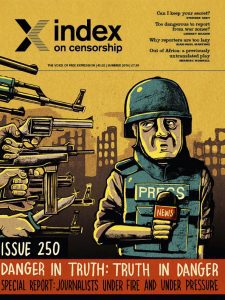
Index on Censorship’s summer magazine 2016
We’ll send you our weekly emails and periodic updates on our events. We won’t share your personal information with anyone outside Index.
You’ll also get access to an exclusive collection of articles from our landmark 250th issue of Index on Censorship magazine exploring journalists under fire and under pressure. Your downloadable PDF will include reports from Lindsey Hilsum, Laura Silvia Battaglia and Hazza Al-Adnan.[/vc_column_text][/vc_column][vc_column width=”1/2″][gravityform id=”20″ title=”false” description=”false” ajax=”false”][/vc_column][/vc_row][vc_row][vc_column][vc_separator color=”black”][/vc_column][/vc_row][vc_row][vc_column][vc_basic_grid post_type=”post” max_items=”12″ style=”load-more” items_per_page=”4″ element_width=”6″ grid_id=”vc_gid:1493908631860-3269808c-fbd5-9″ taxonomies=”579″][/vc_column][/vc_row]
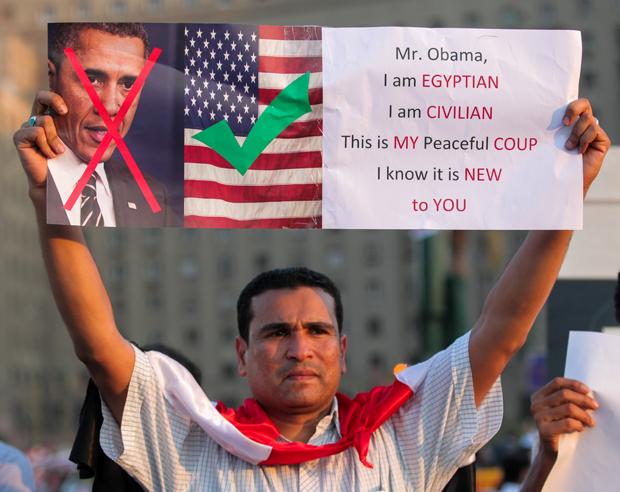
An Egyptian protestor holds a sign showing the anger of some Egyptian people towards the American government. (Photo: Amr Abdel-Hadi / Demotix)
Index on Censorship condemns today’s attacks on protest camps in Cairo and other cities and calls on Egyptian authorities to respect the right to peaceful protest. Live coverage Al Jazeera | BBC | The Guardian
Xenophobia in general and anti-US sentiment, in particular, have peaked in Egypt since the June 30 rebellion that toppled Islamist President Mohamed Morsi and the Egyptian media has, in recent weeks, been fuelling both.
Some Egyptian newspapers and television news has been awash with harsh criticism of the US administration perceived by the pro-military, anti-Morsi camp as aligning itself with the Muslim Brotherhood. The media has also contributed to the increased suspicion and distrust of foreigners, intermittently accusing them of “meddling in Egypt’s internal affairs” and “sowing seeds of dissent to cause further unrest”.
A front page headline in bold red print in the semi-official Al Akhbar newspaper on Friday 8 Aug proclaimed that “Egypt rejects the advice of the American Satan.” The paper quoted “judicial sources” as saying there was evidence that the US embassy had committed “crimes” during the January 2011 uprising, including positioning snipers on rooftops to kill opposition protesters in Tahrir Square.
The stream of anti-US rhetoric in both the Egyptian state and privately-owned media has come in parallel with criticism of US policies toward Egypt by the country’s de facto ruler, Defense Minister Abdel Fattah el Sissi, who in a rare interview last week, told the Washington Post that the “US administration had turned its back on Egyptians, ignoring the will of the people of Egypt.” He added that “Egyptians would not forget this.”
Demonizing the US is not a new trend in Egypt. In fact, anti-Americanism is common in the country where the government has often diverted attention away from its own failures by pointing the finger of blame at the United States. The public has meanwhile, been eager to play along, frustrated by what is often perceived as “a clear US bias towards Israel”.
In Cairo’s Tahrir Square, anti-American banners reflect the increased hostility toward the US harboured by opponents of the ousted president and pro-Morsi protesters alike, with each camp accusing the US of supporting their rivals. One banner depicts a bearded Obama and suggests that “the US President supports terrorism” while another depicts US ambassador to Egypt Anne Patterson with a blood red X mark across her face.
The expected nomination of US Ambassador Robert Ford — a former ambassador to Syria who publicly backed the Syrian opposition that is waging war to bring down the regime of Bashar El Assad — to replace Patterson, has infuriated Egyptian revolutionaries, many of whom have vented their anger on social media networks Facebook and Twitter. In a fierce online campaign against him by the activists, Ford has been criticized as the “new sponsor of terror” with critics warning he may be “targeted” if he took up the post. Ambassador Ford who has been shunned by the embattled Syrian regime, has also been targeted by mainstream Egyptian media with state-owned Al Ahram describing him as “a man of blood” for allegedly “running death squads in Iraq” and “an engineer of destruction in Syria, Iraq and Morocco.” The independent El Watan newspaper has also warned that Ambassador Ford would “finally execute in Egypt what all the invasions had failed to do throughout history.”
The vicious media campaign against Ford followed critical remarks by a military spokesman opposing his possible nomination. “You cannot bring someone who has a history in a troubled region and make him ambassador, expecting people to be happy with it”, the spokesman had earlier said.
Rights activist and publisher Hisham Qassem told the Wall Street Journal last week that “Egyptian media often adopts the state line to avoid falling out of favour with the regime.”
Statements by US Senator John McCain who visited Egypt last week to help iron out differences between the ousted Muslim Brotherhood and the military, have further fuelled the rising tensions between Egypt and the US. McCain suggested that the June 30 uprising was a “military coup”, sparking a fresh wave of condemnation of US policy in the Egyptian press.
“If it walks like a duck, quacks like a duck, then it’s a duck,” Senator John McCain had said at a press briefing in Cairo. He further warned that Egypt was “on the brink of all-out bloodshed.” The remarks earned him the wrath of opponents of the toppled president who protested that his statements were “out of line” and “unacceptable.” The Egyptian press meanwhile has accused him of siding with the Muslim Brotherhood and of allegedly employing members of the Islamist group in his office.
The anti-Americanism in Egypt is part of wider anti-foreign sentiment that has increased since the January 2011 uprising and for which the media is largely responsible. Much like in the days of the 2011 uprising that toppled Hosni Mubarak, the country’s new military rulers are accusing “foreign hands” of meddling in the country’s internal affairs, blaming them for the country’s economic crisis and sectarian unrest. The US has also been lambasted for funding pro-reform activists and civil society organizations working in the field of human rights and democracy.
Ahead of a recent protest rally called for by Defense Minister Abdel Fattah El Sissi to give him “a mandate to counter terrorism”, the government warned it would deal with foreign reporters covering the protests as spies. As a result of the increased anti-foreign rhetoric in the media, a number of tourists and foreign journalists covering the protests have come under attack in recent weeks. There have also been several incidents where tourists and foreign reporters were seized by vigilante mobs looking out for “spies” and who were subsequently taken to police stations or military checkpoints for investigation. While most of them were quickly freed, Ian Grapel — an Israeli-American law student remains in custody after being arrested in June on suspicion of being a Mossad agent sent by Israel to sow “unrest.”
Attacks on journalists covering the protests and the closure of several Islamist TV channels and a newspaper linked to the Muslim Brotherhood do not auger well for democracy and freedoms in the new Egypt. The current atmosphere is a far cry from the change aspired for by the opposition activists who had taken to Tahrir Square just weeks ago demanding the downfall of an Islamist regime they had complained was restricting civil liberties and freedom of speech.
The increased level of xenophobia and anti-US sentiment could damage relations with America and the EU at a time when the country is in need of support as it undergoes what the new interim government has promised would be a “successful democratic transition.”
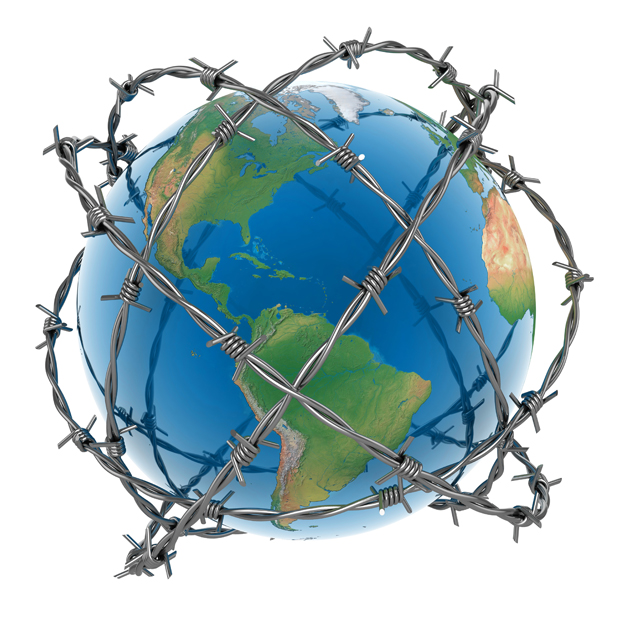
(Photo illustration: Shutterstock)
Around the world, there is confusion and alarm over the impact of the U.S. National Security Agency’s (NSA) surveillance program on human rights. In the U.S., the debate is focusing on the gross violations of privacy rights of Americans. Barely a word is being spoken about the human rights of people outside the country whose personal communications are being targeted, and whose communications content is collected, stored, analyzed and used with little legal protection.
A growing group of international civil society groups and individuals wants that to change and is coming together to present the newly empowered U.S. Privacy and Civil Liberties Board (PCLOB) with a joint letter, asking the Board to make “recommendations and findings designed to protect the human rights not only of U.S. persons, but also of non-U.S. persons.” Before PCLOB’s mid-September deadline for public comments, I encourage global civil society to add their name to this powerful statement.
As the letter makes clear, there is great concern from the global community that the recently revealed surveillance program conducted under Section 702 of the Foreign Intelligence Surveillance Act (FISA) poses a severe threat to human rights. It rightly notes that the surveillance “ strikes at the heart of global digital communications and severely threatens human rights in the digital age.” “The use of unnecessary, disproportionate, and unaccountable extra-territorial surveillance not only violates rights to privacy and human dignity, but also threatens the fundamental rights to freedom of thought, opinion and expression, and association that are at the center of any democratic practice. Such surveillance must be scrutinized through ample, deep, and transparent debate. Interference with the human rights of citizens by any government, their own or foreign, is unacceptable.”
Why then is all the attention in the U.S. focused on just the rights of Americans? The U.S. draws its obligations to protect rights in conducting surveillance from the U.S. Constitution, specifically the Fourth Amendment, which protects “The right of the people to be secure in their persons, houses, papers, and effects, against unreasonable searches and seizures.” The “people” generally means all people located within the United States regardless of citizenship, and then only when they have a “ reasonable expectation of privacy.”
Except in the most extraordinary circumstances, and for U.S. citizens and lawful residents when they are travelling abroad, people outside the U.S. have no privacy protections under the Fourth Amendment. This is a feature in the U.S. Constitution and it animates every part of U.S. surveillance law and practice. That is why Section 702 of FISA requires targeting and minimization guidelines that are aimed (albeit inadequately) at ensuring that the communications being targeted are those of people reasonably believed to be outside the U.S. It’s also why they provide some level of protection for ordinary Americans whose communications are ensnared in foreign intelligence activities and take no notice of the rights of ordinary people all over the world whose personal communications now reside in NSA databases.
It may be hard to fathom now, but Congress created the FISA Court to rein in surveillance after revelations about illegal political spying on Americans surfaced in the 1970’s. The Court had a narrow charge: to ensure that electronic surveillance conducted in the United States for intelligence purposes is conducted pursuant to a warrant. The warrant protection did not apply to surveillance conducted outside the U.S., so it did not protect the rights of foreigners outside the U.S. However, in those days, communications surveillance within the U.S. was a limited and highly targeted activity aimed at hostile foreign powers and their agents. The phone conversations of ordinary people were of no interest. International phone calls between a person in the U.S. and person abroad were quite expensive and relatively rare.
Today, the assumptions that informed the enactment of FISA have been worn thin by a radical shift in threats – from states to diffuse non-state actors – and an even more radical shift in technology. The advent of the internet, the data storage revolution and big data analytics, fueled by fears about terrorism, have, in the post-PATRIOT Act world, fueled a growing government appetite for data. Today, the NSA isn’t just trying to listen in on the embassy abroad of a Cold War rival; instead, it doesn’t know whom to listen in on because it does not know who might pose a threat. In the process, individualized targeting based on specific indicia of threat has given way to bulk programmatic targeting of foreign communications without any consideration of human rights of people beyond our borders.
This position is simply untenable in today’s much smaller world, where the Cold War line between “us” and “them” has blurred.
When FISA was enacted, there was no global internet and the cost of international calls was prohibitive. Large parts of the world were unreachable for political or technical reasons. Now, we are a nation of more immigrants, global businesses and frequent travelers. We live online and carry our cell phones everywhere. The cost of an international call has plummeted by more than 90% and the number of U.S. billed international calls and the use of VOIP has skyrocketed. Skype calls worldwide alone grew 44% to 167 billion minutes in 2012.
Everyday, Americans are calling, emailing, texting and “friending” family, friends, colleagues and customers around the world, engaging in so-called “foreign communications.” For those on the other side of our emails and calls, there is no protection for free expression or privacy rights. In fact, their communications may be collected, examined and used by the government for any legal purpose.
The U.S. is certainly not alone in the breadth of its surveillance activities. Britain’s spy agency monitors the cables that carry the world’s phone calls and internet traffic in close cooperation with the NSA. Indeed, according to leaked documents, Britain’s GCHQ collects more metadata than the NSA with fewer limitations. Germany’s foreign intelligence agency, the BND, is monitoring communications at a Frankfurt communications hub that handles international traffic to, from and through Germany, and the BND is seeking to significantly extend its capabilities. Le Monde reports that France runs a vast electronic spying operation using NSA-style methods, but with even fewer legal controls. And Russia’s notorious SORM system is reportedly even more advanced than the American system.
The U.S. is also not alone in focusing most of the protections of its surveillance laws internally. Such focus is also a feature of the surveillance laws and practices in democratic countries around the world, most of which take a highly territorial view of their human rights obligations and are unlikely to willingly give them extraterritorial application.
There is an urgent conversation to be had in the U.S and beyond about the implications of cross-border surveillance. Given the globalization of information society services, we now must assume that the data pertaining to the citizens of one country will flow through the infrastructure of another and be subject to collection and use for national security purposes. Surveillance standards must be strengthened everywhere to ensure that robust judicial oversight and that principles of specificity, necessity, proportionality, data minimization, use limitation and redress for misuse are the norm. In a globally networked world, legal standards must also recognize the human rights implications of cross-border surveillance and set out a way forward to protect the rights of people beyond state borders. There is ambiguity about whether our largely territorial human rights paradigm is adequate to meet the challenge.
That is why the call to PCLOB to speak to the rights of non-Americans is so important. PCLOB has a simple mission: to make sure privacy and civil liberties are at the table as new security measures to protect the nation are considered. It has boldly taken on the NSA surveillance program as its first task, but it is too soon to know whether it has the muscle or the will power to push meaningful reforms. It has an opportunity to show global leadership by heeding the call to make concrete recommendations about the rights of non-U.S. persons that can frame the global discussion about surveillance and human rights going forward. Add your name to the letter and tell PCLOB to seize the opportunity.